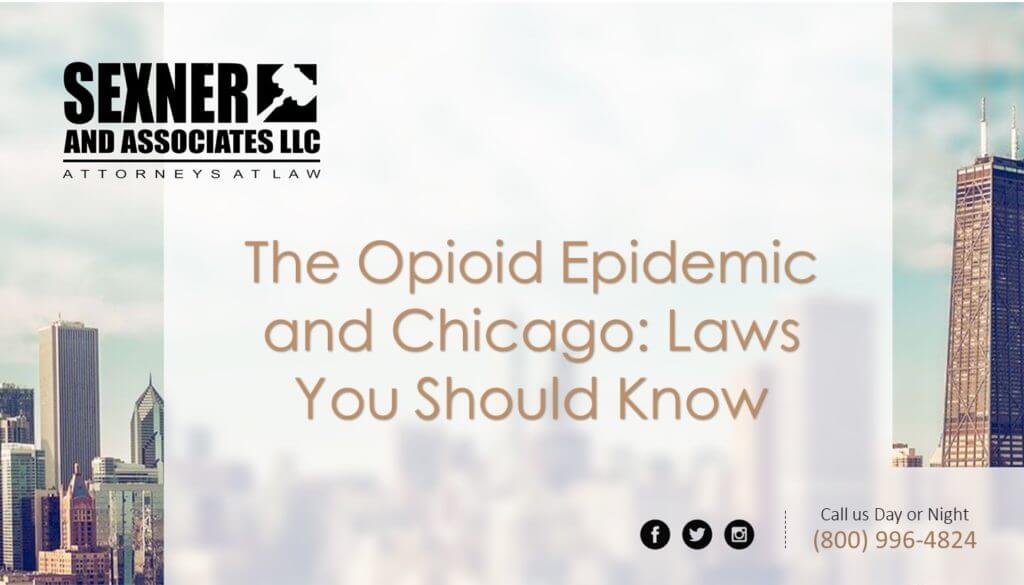
There is an increasing need for substance abuse education as the opioid epidemic continues to sweep through the United States. Consider the 1,889 people who died as a result of opioid overdoses in Illinois in 2016. Perhaps they would still be alive if they understood the dangers of illicit opioid abuse.
We are seeing this attitude adopted by lawmakers across the state. Governor Rauner has appointed a task force to help implement sweeping change. Their goal is to reduce opioid overdose deaths by a third by 2020.
Before tackling this reduction in overdose deaths though, it is important to understand specific Chicago opioid laws. This can help individuals struggling with opioid use, abuse, or addiction to understand the consequences of their actions and make informed choices.
As one of Chicago’s premier drug crime defense law firms, we are here to help. We have decades of experience with Cook County prosecutors and can help you understand the significance of complicated and often overwhelming laws.
Cook County Drug Laws
Opioid abuse is a nuanced issue and, in many cases, the laws surrounding it are not. You should always consult with an experienced attorney after an arrest. This includes arrests for the possession or sale of prescription and street opioids.
This means that although we are detailing Cook County opioid laws here, there are many factors that may influence your specific situation. The fundamentals of drug crime charges are important to remember as you read on.
Possession of heroin is a complicated charge. If someone is arrested with less than a few grams of heroin, it may be considered simple possession. But it may also be considered possession with intent to traffic depending upon certain factors like the packing of the drugs and the possession of trafficking paraphernalia (scales, baggies, currency, etc.).
Simple possession of heroin is a felony that brings with it serious consequences. A first offense brings with it fines of thousands of dollars and many years in prison. The specific sentence depends on which type of felony was committed: a Class 1, Class 2, Class 3 or Class 4, for instance. These categories depend on the amount of heroin found. Repeated arrests for possession of heroin will lead to stricter sentences.
The sale, manufacture, or possession with intent to traffic heroin is also incredibly serious. A first offense with between ten to fifteen grams of heroin or morphine will increase the potential court fines dramatically and increase the potential years in prison. As the amount of heroin or morphine increase, so does the sentencing. If someone is arrested, for example, with between 400 and 900 grams of heroin or morphine, they can face much higher fines or the street value of the drugs and even more years in prison.
The crime of possession of a prescription drug varies in severity depending on the type and quantity of opioid possessed. Prescription drugs are classified by Schedule, which denotes their medical use and potential for abuse. Many opioids fall into Schedule II and include: prescription morphine (Kadian, MS Contin) fentanyl, hydromorphone (Dilaudid), oxycodone (Percocet, Roxicet), fentanyl (Duragesic), hydrocodone (Vicodin, Lortab), methadone, and others.
Possession of a Schedule II opioid may bring with it a fine of up to $25,000 and between one and three years in prison. This is when someone has committed a Class 4 felony. The type and quantity of prescription opioid someone has will determine whether they face a Class X, Class 1, Class 2, Class 3, or Class 4 felony. Depending on the quantity, they may also face intent to distribute charges, which are more serious.
Prescription forgery is a felony (known as a “forged script”). A first offense brings with it potential fines of up to $100,000 and between one and three years in prison. A second offense brings with it a fine of up to $200,000 and between two and five years in prison.
The possession of drug paraphernalia is a Class A misdemeanor. Opioid drug paraphernalia can include: hypodermic syringes, tin foil with opioid residue on it, straws with opioid residue on them, and empty drug baggies. Offenses carry with them a fine of between $750 and $2,500 and as much as one year in jail.
It is also worth pointing out that the use of a firearm during any of the above offenses will greatly increase the punishment. If someone has a gun while committing any of these offenses, they can expect to have many years added to their prison time. If someone fires a gun during any of these offenses, they can expect to have many more years added. If someone fires a gun and it results in injury or death, they can expect to have additional years or possibly natural life added to their prison time.
If you have been arrested for any type of opioid charge, do not wait to contact Mitchell S. Sexner & Associates LLC. We can help and will give you a free case consultation. You can reach us day or night at (312) 644-0444.
